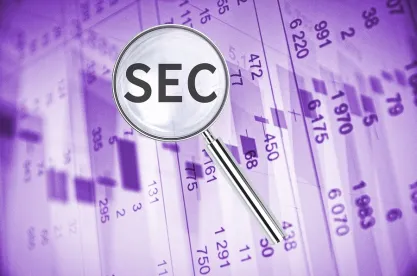On Oct. 7, 2020, the Securities and Exchange Commission (SEC) announced it had adopted a new Rule 12d1-4 under the Investment Company Act of 1940 (Act). The new rule is intended to streamline and enhance the regulatory framework applicable to registered funds that invest in other funds (“fund of funds” arrangements). The new rule is effective 60 days after it is published in the Federal Register.
Background
Section 12(d)(1)(A) of the Act prohibits a registered fund from: (i) acquiring more than 3% of another fund’s outstanding voting securities; (ii) investing more than 5% of its total assets in any one fund; or (iii) investing more than 10% of its total assets in funds generally. Section 12(d)(1)(B) addresses the sell-side of such investments by limiting a registered open-end fund’s sales of its securities to other investment companies. Section 12(d)(1)(C) contains limitations on fund investments in registered closed-end funds. These restrictions are designed to prevent fund of funds arrangements that allow the acquiring fund to control the assets of the acquired fund and use those assets to enrich the acquiring fund at the expense of acquired fund shareholders. These restrictions are also intended to limit the potential for duplicative and excessive fees when one fund invested in another and the formation of overly complex structures that could be confusing to investors. For many years a fund interested in exceeding these limitations has been required to seek an exemptive order from the SEC to permit the fund to engage in investments in funds that are not authorized under these provisions.
Conditions of the New Rule
Rule 12d1-4 permits a registered investment company or business development company (BDC) (collectively, “acquiring funds”) to acquire the securities of any other registered investment company or BDC (collectively, “acquired funds”) in excess of the limits in section 12(d)(1), subject to the conditions set forth below. The new rule does not permit private funds and unregistered investment companies, such as foreign funds, to rely on the rule as acquiring funds. As a result, private funds and unregistered investment companies may acquire no more than 3% of a U.S. registered fund under the Act.
Control. Rule 12d1-4 prohibits an acquiring fund and its “advisory group” from controlling an acquired fund, except in certain limited circumstances. An “advisory group” is an acquiring fund’s investment adviser or sub-adviser, and any person controlling, controlled by, or under common control with such investment adviser or sub-adviser. The Act defines control to mean the power to exercise a controlling influence over the management or policies of a company, unless such power is solely the result of an official position with such company. The Act also creates a rebuttable presumption that any person who, directly or indirectly, beneficially owns more than 25% of the voting securities of a company controls the company and that any person who does not own that amount does not control it. An acquiring fund and its advisory group’s beneficial ownership of up to 25% of the voting securities of an acquired fund would be presumed not to constitute control over the acquired fund. If, however, facts and circumstances gave an acquiring fund and its advisory group the power to exercise a controlling influence over the acquired fund’s management or policies, the acquiring fund and other funds in its advisory group would not be able to rely on the rule even if the fund and its advisory group owned 25% or less of the acquired fund’s voting securities.
Voting. Rule 12d1-4 requires an acquiring fund and its advisory group to use mirror voting (voting the shares held by the acquiring fund in the same proportion as the vote of all other holders of the acquired fund) if it holds more than 25% of an acquired open-end fund due to a decrease in the outstanding securities of the acquired fund and if it holds more than 10% of a closed-end fund. Pass-through voting can be used only if mirror voting is not possible, such as when an acquired fund is only offered to acquiring funds relying on the new rule.
The new rule includes exceptions to the control and voting conditions, which are meant to include fund of funds arrangements described in Section 12(d)(1)(G), when: (i) an acquiring fund is within the same group of investment companies (investment companies that hold themselves out to investors as related companies for purposes of investment and investor services) as an acquired fund; or (ii) the acquiring fund’s investment sub-adviser or any person controlling, controlled by, or under common control with such investment sub-adviser acts as the acquired fund’s investment adviser.
Required Findings. Rule 12d1-4 requires an acquired fund’s investment adviser to find that any undue influence concerns associated with the acquiring fund’s investment in the acquired fund are reasonably addressed, after considering the following factors: (i) the scale of contemplated investments by the acquiring fund and any maximum investment limits; (ii) the anticipated timing of redemption requests by the acquiring fund; (iii) whether, and under what circumstances, the acquiring fund will provide advance notification of investment and redemptions; and (4) the circumstances under which the acquired fund may elect to satisfy redemption requests in kind rather than in cash and the terms of any redemptions in kind. In addition to the factors described above, an acquired fund’s adviser must also consider any other relevant regulatory requirements when evaluating a fund of funds arrangement, such as how the adviser will manage the fund’s liquidity risk management program required by Rule 22e-4 under the Act. The new rule also will require certain findings with respect to unit investment trusts (UITs) and separate accounts funding variable insurance contracts, taking into account the unique structural characteristics of such entities.
Rule 12d1-4 requires the acquiring fund’s adviser to evaluate the complexity of the structure associated with the acquiring fund’s investment in the acquired fund. Also, the acquiring fund’s adviser must evaluate the relevant fees and expenses and find that the acquiring fund’s fees and expenses do not duplicate the fees and expenses of the acquired fund. In evaluating the complexity of a fund of funds structure, an acquiring fund adviser should consider (i) the complexity of the acquiring fund’s investment in an acquired fund versus direct investment in assets similar to the acquired fund’s holdings; (ii) whether the resulting structure would make it difficult for shareholders to appreciate the fund’s risks or get around the acquiring fund’s investment restrictions and limitations; and (iii) whether an acquired fund invests in other funds, which may create additional complexity.
The new rule requires the adviser to both acquiring and acquired funds to report its evaluation, finding, and the basis for its evaluation or finding to the fund’s board of directors no later than the next regularly scheduled board meeting after the fund of funds investment is made.
Fund of Funds Investment Agreement. Rule 12d1-4 requires acquiring and acquired funds that do not have the same investment adviser to enter into an agreement prior to the purchase of acquired fund shares in excess of section 12(d)(1)’s limits (a “fund of funds investment agreement”). The fund of funds investment agreement must include (i) any material terms necessary for the acquiring and acquired fund’s advisers to make their required findings; (ii) a termination provision whereby either party can terminate the agreement with advance written notice within a period no longer than 60 days; and (iii) a provision requiring an acquired fund to provide the acquiring fund with fee and expense information to the extent reasonably requested. The new rule does not require acquired funds and acquiring funds that are advised by the same adviser to enter into a fund of funds investment agreement. This agreement will enable an acquired fund to screen potential acquiring fund investors and set conditions on investments in the acquired fund, if desired. The agreement also will allow an acquired fund to terminate the agreement with an acquiring fund without penalty, which would then prohibit the acquiring fund from making additional purchases of the acquired fund beyond the section 12(d)(1)(A) limits.
Complex Structures. To address the concern that complex multi-tier fund structures could lead to excessive fees and investor confusion, the new rule includes conditions designed generally to restrict fund of funds arrangements to two tiers with certain exceptions. These exceptions include securities of another investment company that is: (i) acquired in reliance on section 12(d)(1)(E) of the Act (i.e., master-feeder arrangements); (ii) acquired pursuant to rule 12d1-1 (i.e., investments in money market funds); (iii) a subsidiary wholly owned and controlled by the acquired fund; (iv) received as a dividend or as a result of a plan of reorganization of a company; or (v) acquired pursuant to exemptive relief from the SEC to engage in interfund borrowing and lending transactions. In addition to these exceptions, the rule will allow an acquired fund to invest up to 10% of its total assets in other funds (including private funds), without regard to the purpose of the investment or types of underlying funds.
Related Amendments
In connection with the adoption of the new rule, the SEC rescinded rule 12d1-2 under the Act, which permits funds that rely on Section 12(d)(1)(G) with flexibility to invest in securities of funds that are not part of the same group of investment companies, as well as stocks, bonds, and other securities, and amended rule 12d1-1 to allow funds that rely on section 12(d)(1)(G) to invest in money market funds that are not part of the same group of investment companies in reliance on that rule. In addition, the SEC rescinded certain exemptive relief that has been granted from sections 12(d)(1)(A), (B), (C), and (G) of the Act permitting fund of funds arrangements that fall within the scope of rule 12d1-4. However, previous exemptive relief granted for fund of funds arrangements outside the scope of the new rule was not rescinded.
In connection with the new rule, the SEC also is adopting Form N-CEN disclosure amendments, which require reporting if a fund relied on rule 12d1-4 or the statutory exception in section 12(d)(1)(G) during the reporting period.



 />i
/>i

